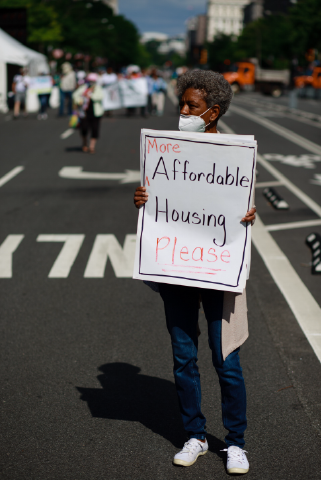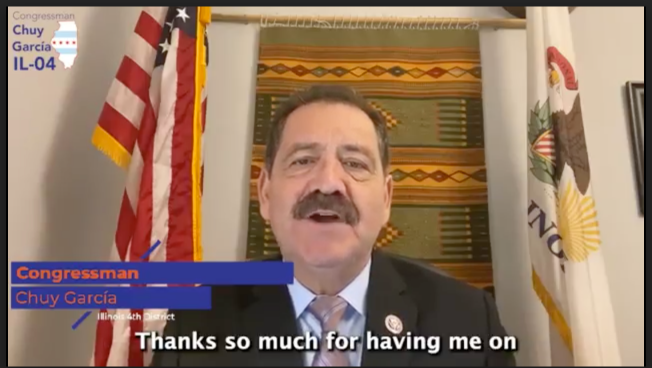Policy Update
Note: Given the fast-changing nature of the legislative process, some information in this article may be outdated by the time of publication.
Update on Budget Reconciliation
Congressional Democrats passed and President Biden signed into law a large social spending and economic recovery bill, the “Inflation Reduction Act of 2022” – formerly the “Build Back Better Act” – using a process called “budget reconciliation.” Budget reconciliation allows a bill to pass the Senate with a simple majority of 51 votes, rather than the 60 votes typically required in the chamber. Even when using budget reconciliation, in an evenly divided Senate (50 Republicans and 50 Democrats) every Democratic senator needed to vote in favor of the bill to see it enacted.
The “Inflation Reduction Act” includes roughly $433 billion in new spending over the next 10 years on climate, energy, and healthcare. However, the bill excludes the targeted affordable housing investments needed to address skyrocketing rents and the severe shortage of affordable, accessible homes available to renters with the lowest incomes. The cost of housing is the single largest component of the Consumer Price Index (CPI), a key measure of inflation, and addressing the cost of housing is vital to decreasing inflationary pressure on households, especially in the long term.
The $1.75 trillion “Build Back Better Act” stalled in the Senate last year after West Virginia Senator Joe Manchin – the lone Democratic holdout in the Senate – announced he would not support the bill as it was written. The bill included $150 billion in affordable housing investments, including significant funding for NLIHC’s HoUSed campaign’s top priorities:
- $25 billion to expand housing vouchers to more than 300,000 households with low incomes.
- $65 billion to make desperately needed repairs to public housing and improve living conditions for its 2.5 million residents.
- $15 billion for the national Housing Trust Fund to build and preserve over 150,000 affordable, accessible homes for households with the lowest incomes.
Senator Manchin instead insisted on a significantly smaller package focused on increasing federal revenues by changing the tax code and using new revenue to fight inflation, address climate change, draw down the federal deficit, and reduce the cost of prescription drugs. With drastic increases in rents across the country, homelessness on the rise, and households struggling to make ends meet, Congress missed an historic opportunity to make bold investments in affordable housing programs targeted to households with the lowest incomes.
Update on Fiscal Year 2023 Appropriations
 The annual appropriations process is an essential task completed by Congress every year to ensure the federal government and all its vital programs – including affordable housing and homelessness programs – continue to operate. Congress is tasked with enacting a new budget by October 1, which marks the beginning of the new federal fiscal year, but it rarely meets this deadline. Instead, Congress typically enacts a short-term continuing resolution (CR), which briefly extends funding for the federal government at its current level, buying Congress more time to finalize its spending bill for the new fiscal year.
The annual appropriations process is an essential task completed by Congress every year to ensure the federal government and all its vital programs – including affordable housing and homelessness programs – continue to operate. Congress is tasked with enacting a new budget by October 1, which marks the beginning of the new federal fiscal year, but it rarely meets this deadline. Instead, Congress typically enacts a short-term continuing resolution (CR), which briefly extends funding for the federal government at its current level, buying Congress more time to finalize its spending bill for the new fiscal year.
The fiscal year (FY) 2022 budget process was delayed almost six months. Long-term delays in the budget process create funding problems for affordable housing and community development programs, which rely on increased funding every year to maintain the number of households being served by vital federal housing programs. However, with both Senate Appropriations Chair Patrick Leahy (D-VT) and Ranking Member Richard Shelby (R-AL) expected to retire after this term, congressional appropriators are particularly motivated to wrap up the FY23 spending bills before the end of the year.
Appropriations leaders in the House and Senate have met a few times over the last couple months to find an agreement on topline spending numbers, which set an overall limit for how much each appropriations subcommittee can allocate for the various programs under its jurisdiction. However, when these negotiations stalled, the House and Senate moved forward with their draft FY23 spending bills in June and July. The House bill proposes to fund HUD’s affordable housing, homelessness, and community development programs at $62.7 billion, an increase of $9 billion over FY22 levels, and $1.1 billion above the president’s FY23 budget request. The Senate bill would provide HUD with $3 billion less than the House bill, and $1.9 billion less than President Biden’s FY23 budget request.
Because congressional leaders are not expected to reach an agreement on spending soon, it is likely that Congress will enact a CR to keep the government open after the start of the fiscal year on October 1, pushing off decisions about final spending bills until later this year.
You can add your organization to a sign-on letter urging Congress to invest in affordable housing and community development programs in fiscal year 2023. For more information, contact Kim Johnson, senior policy analyst, at [email protected]
The Our Homes, Our Votes Act
Voters must update their registration each time they move to a new home. Because renters move more often than homeowners, they must re-register to vote more often. This obstacle is one reason why high-income homeowners register and vote at higher rates than renters.
But what if updating your voter registration were automatically connected with the move-in process? If you’ve applied for a driver’s license or updated your information at your local Department of Motor Vehicles, you’ve seen what this seamless integration can look like. The “National Voter Registration Act of 1993,” better known as the “Motor Voter Law,” requires state motor vehicle authorities to treat driver’s license applications and other paperwork as simultaneous voter registration applications for eligible voters. When applying for a driver’s license, voter registration is as simple as checking a few extra boxes on a piece of paperwork you were already planning to submit. The motor vehicle authority is then required to send voter registration forms to the state election agency within 10 days.
The “Our Homes, Our Votes Act” (H.R. 2215) would add public housing agencies (PHAs) to the Motor Voter Law. The bill would make voter registration less time-consuming for tenants because PHAs would facilitate voter registration with information that they and PHA-assisted owners already collect from tenants. Owners of PHA-assisted units would be required to (1) integrate voter registration when residents sign their leases and during the annual income recertification process; and (2) transmit voter registration forms to the PHA within 10 days. The PHA would then be required to (3) transmit registration information to the state elections office. The Our Homes, Our Votes Act would also treat private owners of federally assisted housing as voter registration agencies, requiring them to offer voter registration forms, assist applicants as they fill out their forms, and collect completed applications to send to the state elections office.
 Representative Jesús G. “Chuy” García (D-IL-4) is the lead sponsor of the Our Homes, Our Votes Act. He spoke about the urgency of this legislation during the kickoff of the Our Homes, Our Votes: 2022 webinar series.
Representative Jesús G. “Chuy” García (D-IL-4) is the lead sponsor of the Our Homes, Our Votes Act. He spoke about the urgency of this legislation during the kickoff of the Our Homes, Our Votes: 2022 webinar series.
“Tenants in public and affordable housing have already verified their identity and their address to local authorities – the exact information they need to register to vote,” Rep. García said on the call. “By removing unnecessary barriers that eligible tenants in affordable housing face to register to vote, this bill takes a small step towards equal access at the ballot box. Renters need a voice in our democracy. Tenants in public housing need a voice in our democracy. Let’s make it easier, not harder, for them to vote.”
If you agree with Rep. García, reach out to your members of Congress and ask them to support the Our Homes, Our Votes Act! You can find an email template in NLIHC’s Legislative Action Center at https://nlihc.org/take-action
